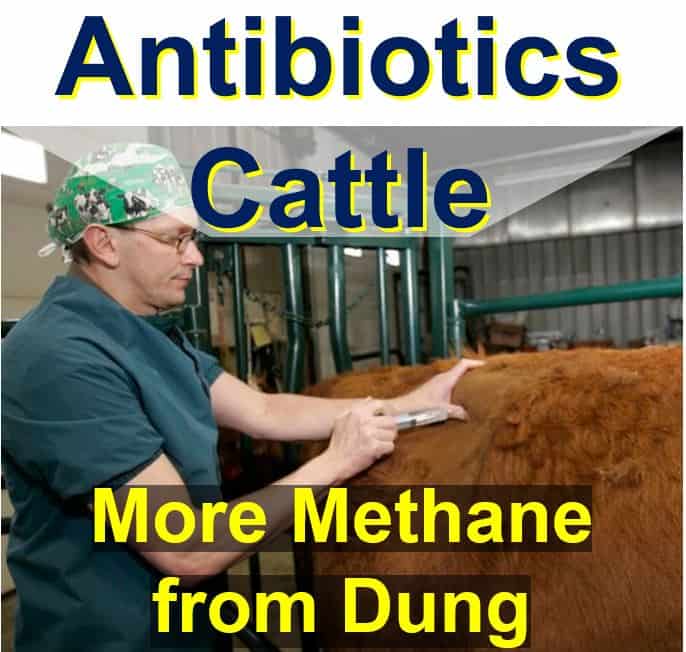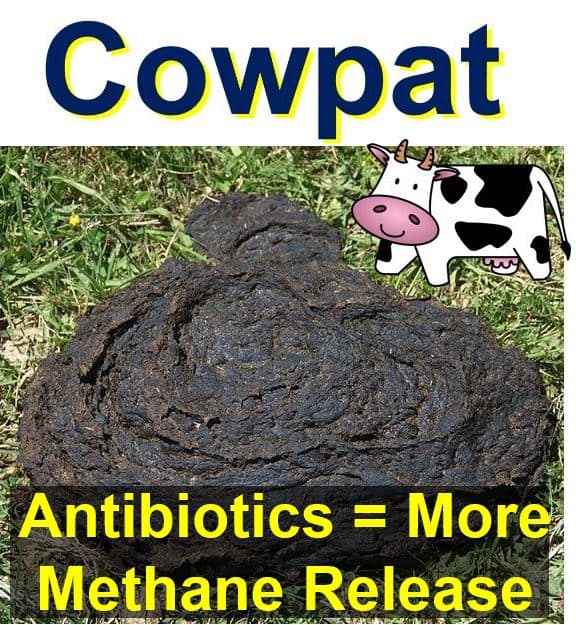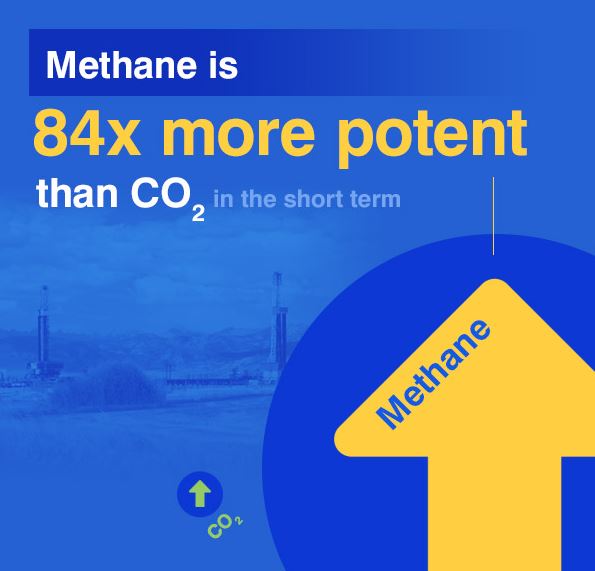If you dose your cattle with antibiotics, you also raise levels of greenhouse gas emissions from cow dung – specifically methane – an international team of scientists discovered. So, apart from exacerbating the global drug resistance problem, veterinary antibiotics also appear to be fuelling global warming.
The researchers suspect antibiotics also increase greenhouse gas emissions that come from cattle’s burps. However, their study did not focus on that end of the digestive system.
The scientists, from the United States and Finland, explained in the scientific journal Proceedings of the Royal Society B (citation below) that antibiotic drugs increase methane production in cow dung. They believe the drugs favour methane-producing, antibiotic-resistant microorganisms in the intestines.
 Dosing cattle with antibiotics increases the amount of methane released into the atmosphere from cow dung. Methane is a greenhouse gas – it exacerbates the global warming problem. (Image: manitobacooperator.ca/livestock)
Dosing cattle with antibiotics increases the amount of methane released into the atmosphere from cow dung. Methane is a greenhouse gas – it exacerbates the global warming problem. (Image: manitobacooperator.ca/livestock)
Dung harmed but not dung beetles
While the study also noticed that antibiotics appear to change the microorganisms that live inside dung beetles, they have no discernible negative effects on our planet’s atmosphere.
Tobin Hammer, a doctoral student in Noah Fierer’s lab and also in Deane Bowers’ lab at the University of Colorado at Boulder, and colleagues from the same university and the University of Helsinki in Finland, say their findings are proof that antibiotic use in agriculture has unintended, cascading effects on our environment.
In this study, the scientists followed the trail of antibiotics used with farm animals, specifically cattle, and found that the trail did not end at the rear end of the cow.
The researchers treated cattle with a commonly-used broad-spectrum antibiotic and assessed downstream effects on the microorganisms in dung and dung beetles, greenhouse gas fluxes from dung, plus beetle size, survival and reproduction.
The microbes in the digestive system of dung beetles changed. Dung beetles are vital components in the improvement of soil and cycling of carbon. However, the beetles’ size, survival status and ability to reproduce did not appear to be harmed.
 Antibiotic treatment raised methane fluxes from cow dung, the researchers found. (Image: adapted from Wikipedia)
Antibiotic treatment raised methane fluxes from cow dung, the researchers found. (Image: adapted from Wikipedia)
However, evident harm was measured in the antibiotic-contaminated cowpats, which produced much more methane – 1.8 times more – than normal uncontaminated cow dung.
Methane or CH4 is an important greenhouse gas. Atmospheric methane concentrations globally have increased by over 150% since 1750, and account for about one-fifth of all the radiative forcing from all the long-lived globally mixed greenhouse gases.
Findings surprised scientists
The team was surprised with the findings, given that previous research had pointed to no or very little impact on cow dung (from antibiotics).
In an interview with BBC News, Mr. Hammer said:
“Most methane generated by cattle is actually released as burps, and we think that antibiotics are likely to increase burped methane as well – but in this study we weren’t able to measure that directly. A second unknown is how generalisable the findings are, across different types of antibiotics.”
“Lastly, we don’t know whether, in terms of environmental impact of antibiotics, the problem of methane emissions is outweighed by the benefits of increasing feed efficiency and treating disease.”
 According to the Environmental Defense Fund: “While methane doesn’t linger as long in the atmosphere as carbon dioxide, it is initially far more devastating to the climate because of how effectively it absorbs heat. In the first two decades after its release, methane is 84 times more potent than carbon dioxide.” (Image: edf.org)
According to the Environmental Defense Fund: “While methane doesn’t linger as long in the atmosphere as carbon dioxide, it is initially far more devastating to the climate because of how effectively it absorbs heat. In the first two decades after its release, methane is 84 times more potent than carbon dioxide.” (Image: edf.org)
In a journal Abstract describing the main article, the researchers wrote:
“The antibiotic effect on beetle microbiota was not associated with smaller size or lower numbers. Unexpectedly, antibiotic treatment raised methane fluxes from dung, possibly by altering the interactions between methanogenic archaea and bacteria in rumen and dung environments.”
“Our findings that antibiotics restructure dung beetle microbiota and modify greenhouse gas emissions from dung indicate that antibiotic treatment may have unintended, cascading ecological effects that extend beyond the target animal.”
Citation: “Treating cattle with antibiotics affects greenhouse gas emissions, and microbiota in dung and dung beetles,” Eleanor Slade, Juhani Taponen, Heidi Viljanen, Tobin J. Hammer, Noah Fierer, Bess Hardwick, Asko Simojoki & Tomas Roslin. Proceedings of the Royal Society B (Biological Sciences), 25 May 2016.DOI: 10.1098/rspb.2016.0150.
Video – Methane gas’ unique role in climate change
This Princeton University video explains in simple terms what the unique role of methane gas in climate change is.

